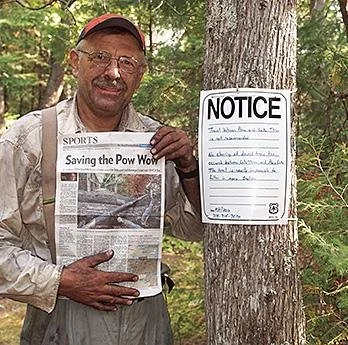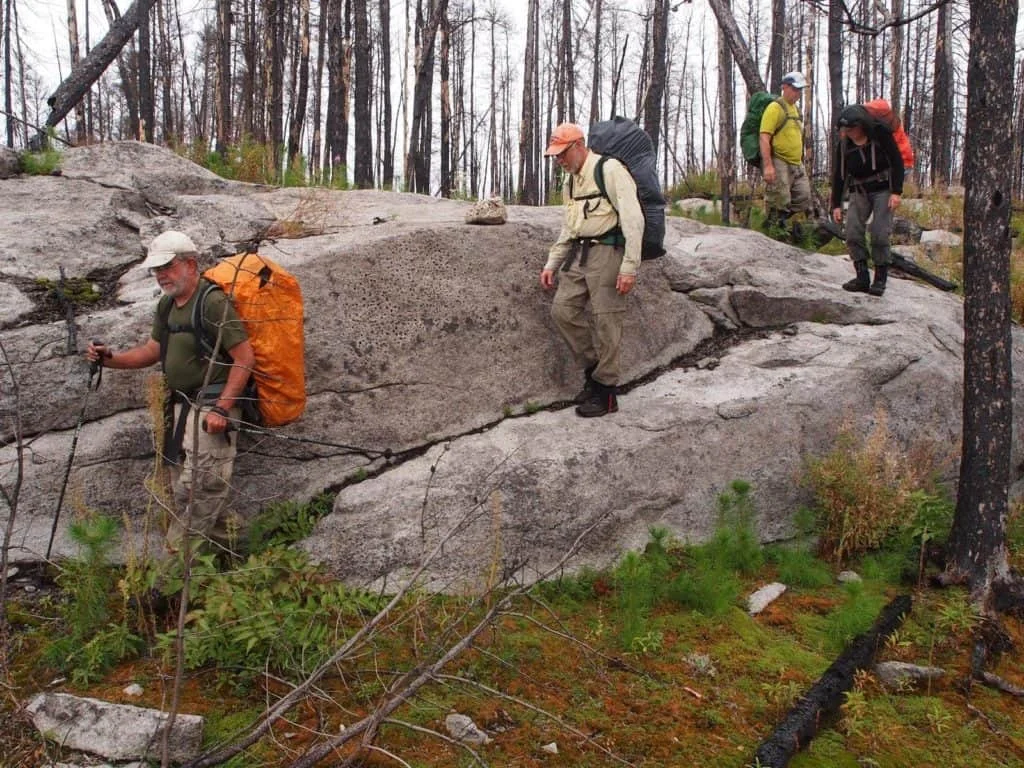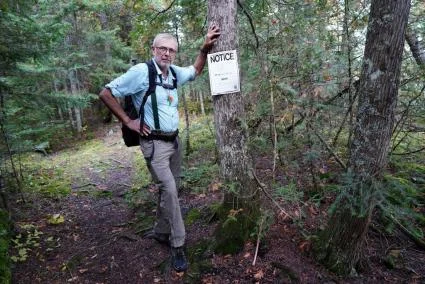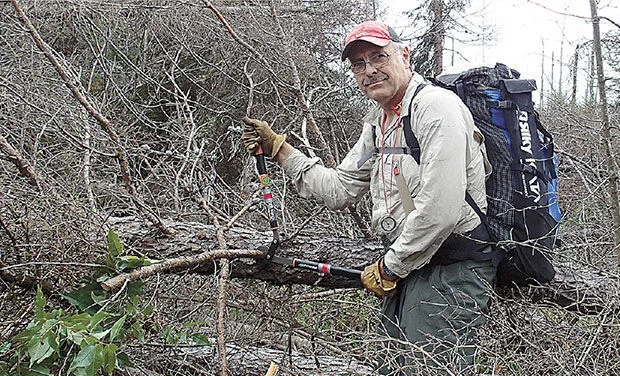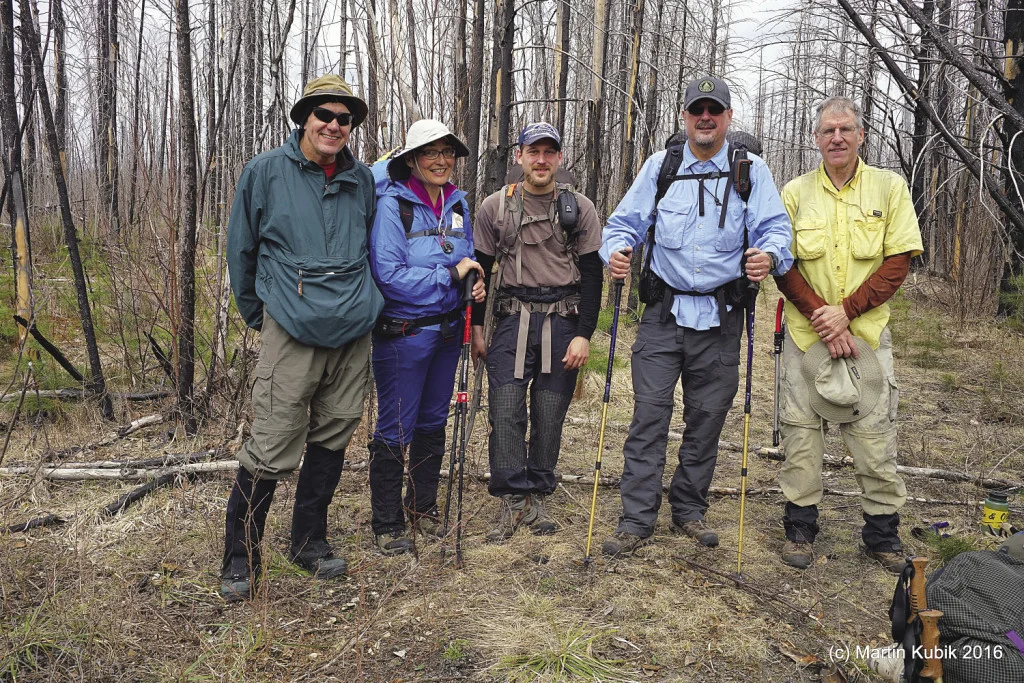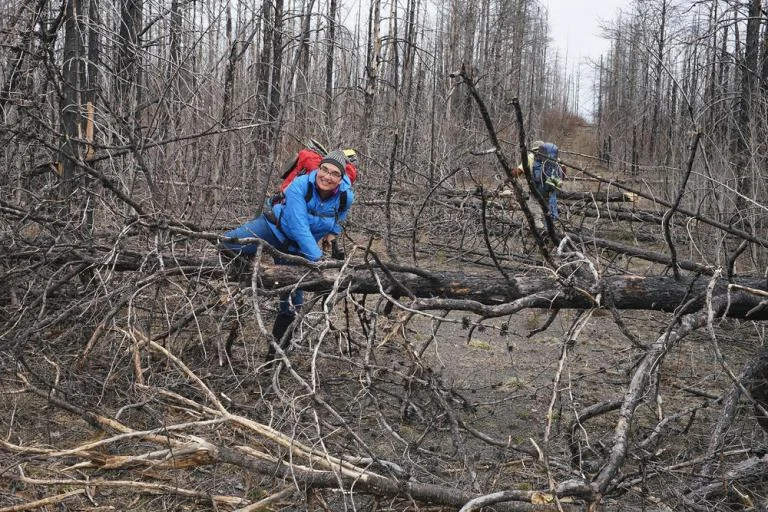
IN THE PRESS
Recently, our good friend Pam Wright of Soka Outdoors recounted her time spent on the Sioux-Hustler Trail, a beloved 30-mile lollipop found in the Boundary Waters Canoe Area Wilderness (BWCAW), in the Quetico Superior Wilderness News.
“Some of my funnest miles were on the Sioux-Hustler Trail. I often describe it as a long stroll through the woods with some of the most beautiful campsites the BWCAW can offer, while navigating the ever-present beaver re-routes the BWCAW is infamous for.” - Boundary Waters Advisory Committee Vice President Mel Yackley
Read on to learn how you can experience this same adventure.
Boundary Waters hiking trails offer a novel and rugged route into canoe country.
I haven’t hiked across the Boundary Waters, where during high season only 2 percent of campers are backpackers. I want new perspective on my formative wilderness, gleaned through sweat and solitude along the state’s toughest footpaths. So I’m leaving the boat at home and traveling by land. I backpack 140 miles through canoe country, more than half of the 230 miles of rugged hiking trails that cross the BWCA, on its three longest trails: the Kekekabic, the Border Route, and the Powwow.
KEEP IT WILD - with special guest Lucas Raudabaugh of the Boundary Waters Advisory Committee (BWAC), a non-profit group of volunteers that helps to maintain over 70 of the 200 miles of trails in the BWCAW. "Keep it Wild is a monthly feature of the WTIP Boundary Waters Podcast.
Jon Benson gets to work in one of his favorite places on Earth.
It’s like a kid who grew up cheering for the Yankees going on to play professional baseball in the Bronx. Though in Benson’s case, his favorite place happens to be the Boundary Waters Canoe Area Wilderness.
The Boundary Waters Advisory Committee hosted an award ceremony for a United States Forest Service ranger Monday evening. Ranger Jon Benson was honored with the Mike Manlove Memorial Award for his 15 years of partnership and service maintaining BWCA trails.
While the trails are maintained by volunteers with the organization, an integral contact for the organization is the Forest Service’s assistant district ranger. Since 2008, Jon Benson has filled this role at the Tofte Ranger District.
A Minnesota nonprofit group fulfills what the U.S. Forest Service is no longer able to do: keep BWCAW trails open to hikers and backpackers
Northern Minnesota boasts one of the world’s premier canoeing destinations: the Boundary Waters Canoe Area Wilderness. The name says it all—the BWCAW is a canoeing paradise. Find a canoe you can comfortably portage, grab a paddle and a pack, and suddenly you can go almost anywhere in a vast 1,000,000-acre wilderness.
But what about those adventurers among us who think a little bit differently? Those who question, shouldn’t the BWCAW also provide amazing possibilities for challenging, remote hiking?
Several trail organizations doing advocacy and trail maintenance work in the Boundary Waters Canoe Area Wilderness (“BWCAW”) hosted an event at the U of M’s Hubert Humphrey School of Public Affairs Saturday in Minneapolis. The event has been held annually, and this was the first time it was held in Minneapolis at this venue.
The Boundary Waters Advisory Committee, which has overseen maintenance and repairs to hiking trails within the Boundary Waters Canoe Area Wilderness, is aiming to keep the Eagle Mountain hiking trail in better shape.
A 32-mile hiking trail in the Boundary Waters Canoe Area Wilderness is restored after being devastated by the 2011 Pagami Creek Wildfire. The Powwow Trail on the southern edge of the wilderness, near Isabella, was deemed impassable and perhaps impossible to bring back to safe hiking condition. Undaunted, a group of dedicated volunteers working with the Superior National Forest have been hard at work to restore the trail.
WTIP’s Joe Friedrichs spoke with Martin Kubik for an update on the Powwow Trail. Kubik is the founder of the Boundary Waters Advisory Committee and a spirited advocate for hiking trails in the BWCA.
Now, after eight years of hard work, the 30-mile long BWCAW Powwow Hiking Trail — which burned almost entirely in the massive 2011 Pagami Creek forest fire — is nearly ready to see hikers again, and trail supporters are ready to celebrate. The event is set for Wednesday from 6 to 7 p.m. at the Duluth Folks School, 1917 W Superior St. It’s free and open to the public.
Today: Martin Kubik, whose nonprofit Boundary Waters Advisory Committee is devoted to the trails of the lakes wilderness. The group is busy planning its spring maintenance work on the Powwow Trail, with projects by canoe, backpack — and cabin — in April and May.
The Boundary Waters Canoe Area Wilderness (BWCAW) is celebrating 40 years since the BWCA Wilderness Act, and 40-year Vadnais Heights resident Martin Kubik wants to thank all the volunteers who have maintained the wilderness trails using handsaws over the last several decades.
A hiking trail is never done. Trees fall down, beavers build dams, bridges wash out, boardwalks disintegrate. Heavy snowstorms last winter clogged several northwoods trails with bent and broken trees badly enough that some are still being cleared.
Here’s a rundown of the maintenance and the people who give their time and bodies to keeping the trails clear.
As the wilderness regenerates following a fire, hikers seek reassurance that the Forest Service won't let the much-loved Powwow Trail fade away.
Minneapolis—Four backpackers, three men and one woman, successfully completed a four-day backpacking trip over the Pow Wow Trail, which burned five years ago in the Pagami Creek Fire, according to the Boundary Waters Advisory Committee (BWAC).
The Pow Wow Trail was once a popular trail with more than twice as many overnight permits as the Sioux Hustler Trail further north, according to Kubik, but the number of overnight permits issued for the Pow Wow Trail dropped by nearly 90 percent in the years since the Pagami Creek Fire.
The Boundary Waters Advisory Committee announced three men and one woman, successfully completed a four day backpacking trip over the Pow Wow Trail burned five years ago in the Pagami Creek Fire.








